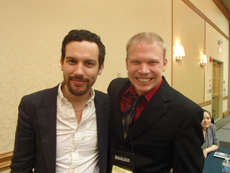 |
Simon OrtizThursday, March 19 |
Review of From Sand Creek
Simon Ortiz's Biography at the Poetry Foundation
Simon Ortiz has been a writer and poet for over thirty-five years. One of the major voices in Indigenous American literature, he is among the first to be published as a contemporary Indigenous American writer of poetry and fiction beginning in the 1960s. His writing continues to address topics and issues of major concern regarding Indigenous American lands, communities, and cultures, including Indigenous decolonization and liberation. He has been involved with Indigenous educational endeavors from elementary to college levels on a number of Indigenous (American Indian) reservations including New Mexico, Arizona, South Dakota, Montana, Wyoming, North Carolina, Oregon, Colorado, and Utah. And in urban Indigenous communities including San Francisco, Oakland, Portland, Tucson, Phoenix, San Diego, Chicago, Denver, New York City, and Toronto. Along with his profession and career as a writer, poet, and storyteller, he has worked as a teacher and community-cultural worker, and been a tribal leader on two occasions as an Interpreter-Translator (1987-88) and First Lieutenant Governor (1988-89) of his Acoma Pueblo tribe in New Mexico. Presently, he is the incoming Managing Editor of RED INK: International Journal of Indigenous Literature, Art, and Humanities. He is also the father of a son and two daughters and a grandfather to their nine children. His collection of poetry, from Sand Creek is the 2015 Convention Common Reader. In 1864, U.S. soldiers massacred Cheyenne and Arapaho women and children. Ortiz's "from Sand Creek makes a large statement about injustices done to Native peoples in the name of Manifest Destiny. It also makes poignant reference to the spread of that ambition in other parts of the world—notably in Vietnam—as Ortiz asks himself what it is to be an American, a U.S. citizen, and an Indian. Indian people have often felt they have had no part in history, Ortiz observes, "and through his work he shows how they can come to terms with this feeling. He invites Indian people to examine the process they have experienced as victims, subjects, and expendable resources—and asks people of European heritage to consider the motives that drive their own history and create their own form of victimization. Through the pages of this sobering work, Ortiz offers a new perspective on history and on America" quoted material is from University of Arizona Press.




 "As a writer I have forever been changed through my convention experiences."
"As a writer I have forever been changed through my convention experiences."